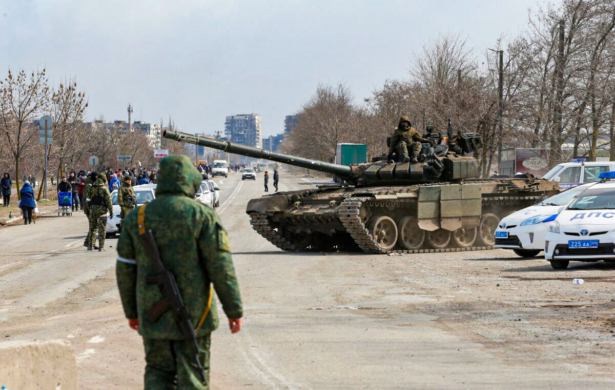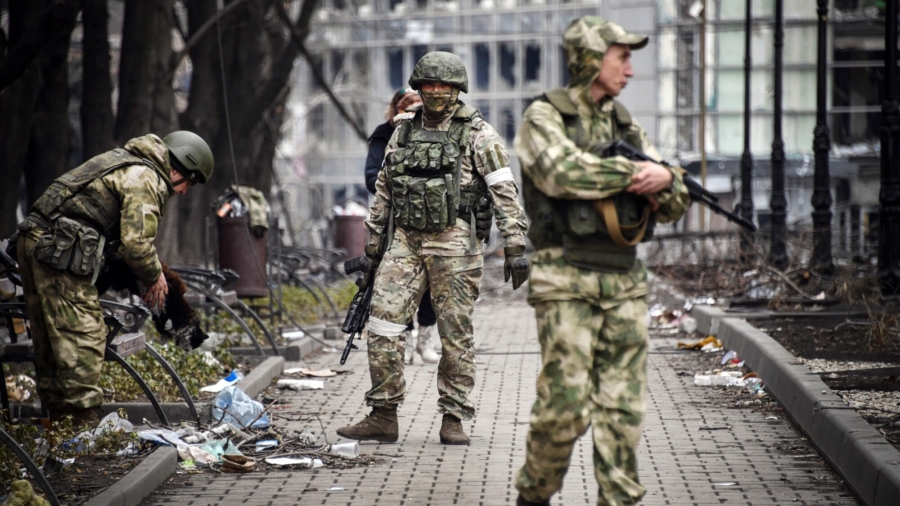The U.S. State Department accused the Russian military on Wednesday of using chemical weapons against Ukrainian military forces in violation of the international Chemical Weapons Convention (CWC).
The State Department has notified Congress of this chemical weapons determination as required under the U.S. Chemical and Biological Weapons Control and Warfare Elimination Act of 1991 (CBW).
“The Department of State has made a determination under the CBW Act that Russia has used the chemical weapon chloropicrin against Ukrainian forces in violation of the Chemical Weapons Convention (CWC),” the department announced. “We make this determination in addition to our assessment that Russia has used riot control agents as a method of warfare in Ukraine, also in violation of the CWC.”
Chloropicrin was one of the first chemicals deliberately and systematically used as a chemical weapon, with German forces employing it against the Allies during World War I.
The State Department concluded that Russian forces had likely begun employing chloropicrin and these other riot control chemicals as a means of dislodging Ukrainian forces from fortified positions as they sought to assert control over an expanding swath of Ukrainian territory.
The State Department’s chemical weapons determination follows similar allegations raised in press accounts and by Ukrainian authorities against Russian troops. Press reports have raised allegations of Russian chemical weapons attacks as far back as 2022.
In a Feb. 9, 2024, Telegram post, the Ukrainian military’s General Staff alleged Russian forces had used chemical agents against Ukrainian troops on hundreds of occasions, including 229 instances in January 2024 alone.
The Ukrainian General Staff said Ukrainian Chemical, Biological, Radiological, and Nuclear (CBRN) reconnaissance units would collect soil and vegetation samples, along with fragments of munitions to validate their chemical weapons allegations.
One particular chemical agent Ukrainian forces alleged Russian troops used was CS, more commonly referred to as tear gas. The CWC states riot control chemicals are not to be used in warfare but does permit their use in law enforcement settings.
While civilians can typically escape riot control gases during protests, soldiers fighting from trenches and other fortified positions could be forced to endure the effects of the chemical agents or risk fleeing under enemy fire to escape their effects.
NTD News reached out to the Russian Embassy in Washington D.C. for comment about the chemical weapons allegations but did not receive a response by press time.
US Sanctions Russian Chemical Programs, Companies
In addition to announcing its determination that Russian forces have used chemical weapons on the Ukrainian battlefield, the State Department and Treasury Department announced sanctions against three Russian Federation government entities associated with Russia’s chemical and biological weapons programs and four Russian companies providing support to such entities.
The newly sanctioned Russian government entities included the Russian military’s Radiological, Chemical, Biological (RCB) unit and the Russian military’s 48th Central Scientific Research Institute. The third sanctioned Russian government entity was the Scientific Research Institute of Applied Acoustics, which the State Department said has had involvement in the Russian military’s chemical weapons program.
Among the four newly sanctioned Russian firms is Joint Stock Company Research and Production Association Transcom (NPO Transcom), a developer of wheeled, tracked transport, and containerized communications facilities accused of contracting with the Russian military’s chemical weapons program.
The three other Russian firms facing new sanctions are Systems of Biological Synthesis, LLC, the Obshchestvo S Ogranichennoi Otvetstvennostiu Tekhnologicheskie Sistemy I Services (OOO TSS), and a third company called Lab Service. These three firms are all described as suppliers of laboratory equipment.

Russia Has Alleged Chemical Weapons Attack From Ukrainian Side
The Russian military has alleged that Ukrainian forces have also employed chemical weapons on the battlefield.
In July 2022, the Russian Ministry of Defense alleged several Russian service members deployed in the eastern Ukrainian region of Zaporizhzhia had been hospitalized and tested positive for botulinum toxin type B in their bodies.
In February 2023, the Russian military said it was examining potential evidence of chemical weapons attacks by Ukrainian forces near the eastern Ukrainian towns of Soledar and Bakhmut. Those allegations of Ukrainian chemical weapons attacks were attributed to individuals in a secessionist region of eastern Ukraine that Russia has claimed control over.
“The enemy’s accusations of the use of chemical weapons by units of the Armed Forces of Ukraine are untrue,” the Ukrainian military said of the February 2023 allegations.
The Organization for the Prohibition of Chemical Weapons (OPCW) was established to ensure CWC signatory nations are complying with the chemical weapons regulations and investigating alleged violations. Thus far the OPCW says it has not been formally asked to open an investigation into the use of prohibited chemical substances in Ukraine.
Reuters contributed to this article.

